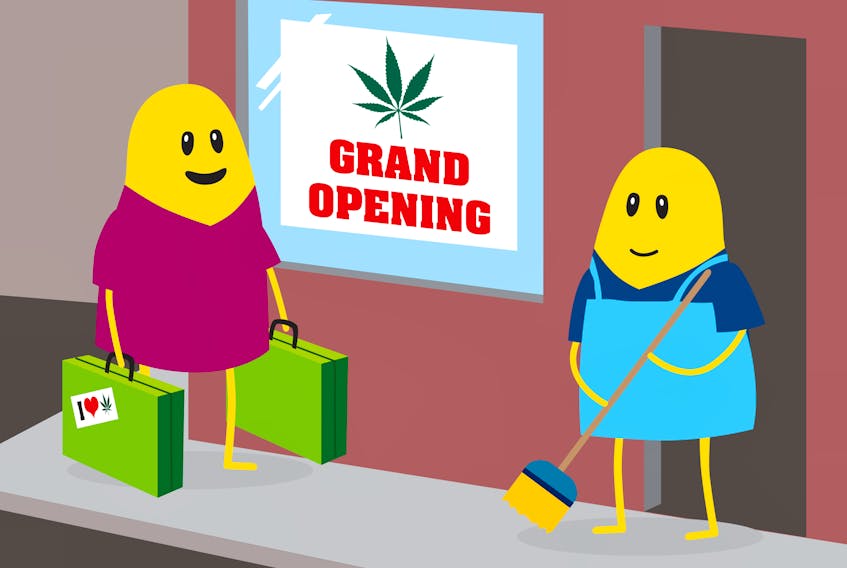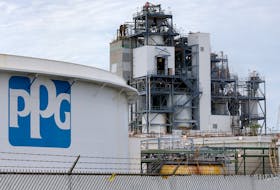Outside, there’s nothing but a green marijuana leaf on a plain white door in the front of a grey-sided building that indicates it houses a medicinal marijuana dispensary.
Inside, though, the hulking power of Bruce Banner #3 buds, a medicinal marijuana product, makes it clear this is no ordinary shop. On the marijuana outlet website, the store’s stock is on display.
There are Pink Death, Purple Candy and Green Crack marijuana buds – along with other varieties. The outlet boasts four types of concentrate, which can be up to three times more potent than the buds, and vaping pens to deliver vaporized cannabis compounds in C02 oil.
Then, there’s a line of edible cannabis products for those ganja gourmets who prefer to ingest their medicinal marijuana in something delicious.
Incredible Medibles’ THC-loaded, "half-baked" brownies, Sweet Herb’s chocolate peanut butter cups, "unicorn" chocolate and beef jerky and Real Leaf’s Blueberry Buzz and other flavoured gummies are there alongside My Sugar Mama’s Jollie Lollies. Looking every bit like a kid’s lollipop, these pack 100 milligrams of cannabis concentrate each. The warning on the label reads: Store in a safe place away from children.
The owner of this Nova Scotia-based legal, medicinal marijuana dispensary does.
But as Canada inches along towards the legalization of recreational marijuana with Bill C-45, the Cannabis Act, now before the Senate, many wonder about the impact of the anticipated boom of stores selling legal weed and its associated products to recreational users.
According to the owner of this medicinal marijuana outlet, that won’t be his outlet.
“I’m running a medical facility here and we intend to continue post legislation,” said the owner, whose name is not used due to concerns about public backlash. “Recreational doesn’t appeal to me in the least.”
Still, his isn’t the only medicinal marijuana dispensary in Atlantic Canada that could, in theory, start selling recreational pot once it becomes legal.
In several American states, many medicinal marijuana outlets quickly converted to recreational sales after legalization.
“Our estimates show that on average legalizing retail marijuana in Colorado increases housing values by approximately six per cent, or $16,500 per property..."
And there are scores of players already making plans to open recreational weed outlets here. In Canada, Second Cup and pot retailer National Access Cannabis struck a deal earlier this year to apply for licences to sell recreational marijuana products in 20 of the coffee chain’s Western Canadian stores. Edmonton-based Fire and Flower is also looking to Atlantic Canada to open up recreational marijuana stores ahead of the anticipated legalization later this year.
Many homeowners may well be wondering what the arrival of a marijuana store in their neighbourhood might mean for property values.
Researchers in the United States say the experience there has so far been good.
Pot outlets boost real estate prices, report University of Mississippi economics professors Cheng Cheng and Walter Mayer and CoreLogic principal economist Yanling Mayer in a paper entitled The Effect of Legalizing Retail Marijuana on Housing Values: Evidence from Colorado.
“Our estimates show that on average legalizing retail marijuana in Colorado increases housing values by approximately six per cent, or $16,500 per property .… In addition, our event study shows that housing values experienced an immediate jump of three per cent within one quarter after the adoption of (recreational marijuana licensing) followed by a steady increase henceforth,” they wrote.
Other researchers have found the same thing.
In their study published in August last year, Contact High: The External Effects of Retail Marijuana Establishments on House Prices, the University of Georgia’s James Conklin, University of Wisconsin-Madison’s Moussa Diop, and Herman Li of California State University in Sacramento reported an even greater boost to home prices after recreational marijuana sales became legal in Colorado.
“We find that single-family residences close to a retail conversion increased in value by approximately eight per cent relative to houses that are located slightly farther away,” they wrote.
Diop, an assistant professor who specializes in real estate and urban land economics, admitted in an interview neither he nor the other researchers know why house prices went up.
He speculates the location of these stores in depressed neighbourhoods may have partly contributed to the greater-than-average percentage increase in values of houses near them during the period of the study.

The owner of a local medicinal marijuana dispensary isn’t surprised by the results of the Colorado studies, the bump up in housing prices after recreational weed was legalized.
“It’s only bringing what’s already going on and putting it on the books and getting the taxes and benefits where people can see them,” he said. “Legalizing it takes the stigma away and people are more comfortable.”
Maybe so.
But homeowners in Atlantic Canada should not expect to see a similar boost to their property values when legal weed stores open up in their neighbourhoods, he said.
“These states may have seen an influx in migration at the same time,” says the local marijuana dispensary owner. “We’re in our own, different scenario because (the legalization of recreational marijuana in Canada) is a countrywide thing.”
In the United States, each state was left to decide for itself whether or not to legalize recreational pot. Colorado was one of the first to do so. Many people speculate that this then led to an influx of people moving from other states where recreational pot was still illegal to Colorado and, more specifically, to places close to recreational pot outlets.
Randall McCauley, vice-president of government and public relations for the Canadian Real Estate Association, thinks the way the United States has rolled out the legalization of recreational pot has led to local increases in real estate prices. He cautions against thinking the same thing will happen in Canada.
“Only a few states legalized it, like Colorado, so they saw an influx of people from other states who wanted to get into the market,” said McCauley.
“That definitely won’t happen here in Canada,” he said.
Saying ‘no’ to home grow-ops
Real Estate association warning growing pot at home causing health concerns, property damage
Damage to homes and to their residents' health will be the most likely results of any law that lets recreational marijuana users grow pot inside their own homes, warn officials with Canada’s biggest real estate association.
“Four (marijuana) plants with proper lights and irrigation is a grow op and it’s a legitimate problem. The humidity has nowhere to go,” said Randall McCauley, vice-president of government and public relations for the Canadian Real Estate Association (CREA), in an interview.
“We’re against growing it in a home. Period,” he said.
Under the Cannabis Act now before the Senate, recreational pot would become legal in Canada. And while some provinces are already dead set against letting people grow marijuana in their own homes, most have so far kept silent on the issue, paving the way for the possibility that Canadians could grow up to four marijuana plants at a time in their homes.
“Risks associated with regular growing of cannabis include mould, spores and fungus. People living in these surroundings with any type of respiratory illness could be adversely affected”
Across Canada, several condo boards have banned the growth of recreational marijuana, which is still illegal. Police and fire chiefs have also come out against letting homeowners grow their own pot.
“Risks associated with regular growing of cannabis include mould, spores and fungus. People living in these surroundings with any type of respiratory illness could be adversely affected,” wrote CREA chief executive officer Michael Bourque earlier this year. “And the damage to the home or apartment is well known to realtors who have encountered grow-ops across the country.”
When a home is damaged due to the problems associated with intensive, indoor marijuana growing, it sometimes needs to be gutted, the drywall removed, and brought down to the studs, said McCauley.
Officials at the Canadian Home Builders’ Association did not return a request for information about possible amenities developers could offer during new home construction, such as rooms with added ventilation, better humidity control, or additional electrical outlets for extra lights or heaters, to allow homeowners to grow marijuana safely.
Sherry Donovan, chief executive officer of the Nova Scotia Home Builders’ Association, described the prospect of developers possibly gaining a competitive, marketing edge in some of their residential projects by offering such marijuana-friendly amenities as interesting.
So far, though, no home builders in Nova Scotia seem to have publicly discussed plans to offer such marijuana-growing rooms or areas in their residential developments.
“We haven’t at the provincial level talked about that and it hasn’t come up,” said Donovan.









